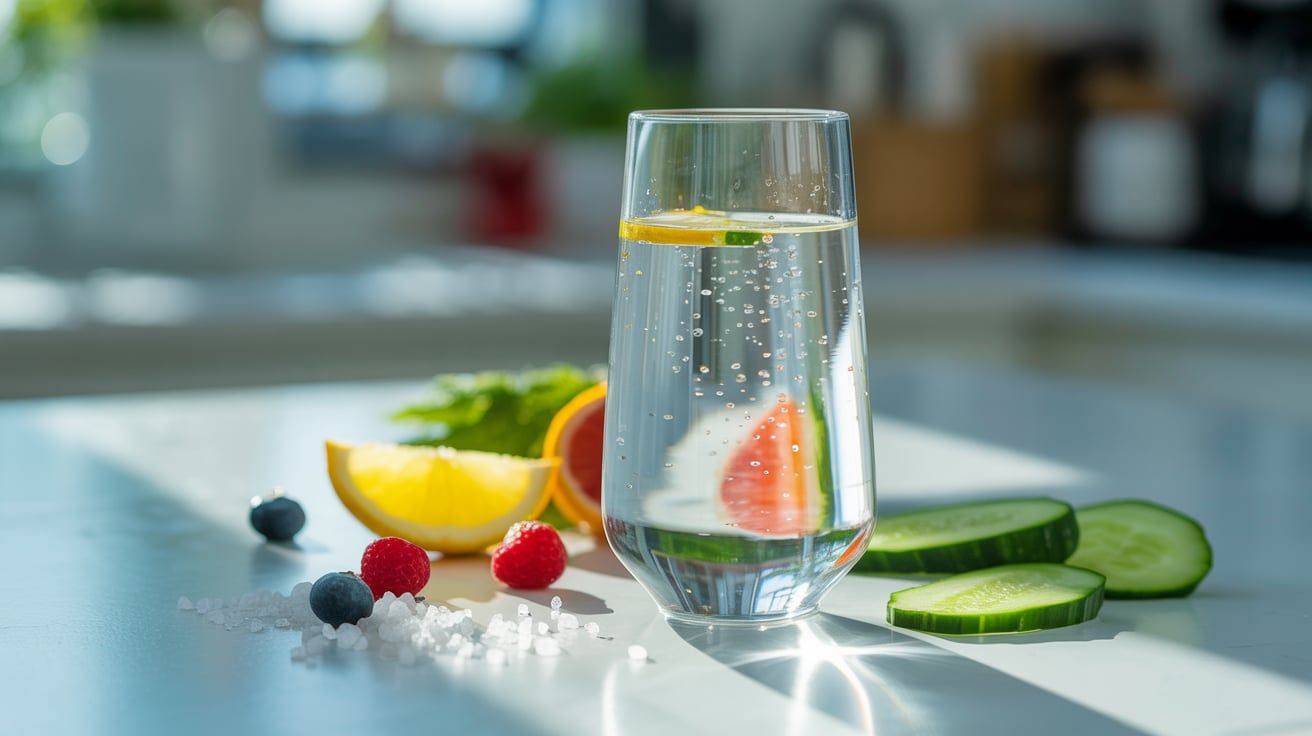
The Siren Song of Simple Solutions
Ever felt sluggish, headachy, or just plain “off”? Chances are, someone, with the best of intentions, chirped, “Just drink more water!” It’s become the universal panacea, the go-to advice for everything from fatigue to bad skin. While hydration is undeniably crucial for our health and wellness, treating it as a one-size-fits-all solution is not only simplistic, but can also be misleading and even detrimental. It ignores the complex interplay of factors that contribute to our overall well-being and can prevent us from addressing the real underlying issues.
Think of it like this: your car is making a strange noise. Would you simply add more gasoline and hope it goes away? Probably not. You’d investigate the source of the problem. Similarly, our bodies are intricate machines, and dismissing symptoms with a blanket “drink more water” approach is like putting a band-aid on a broken leg. It might offer temporary relief, but it won’t fix the root cause. Let’s delve into why this seemingly harmless advice falls short and explore more effective strategies for achieving optimal hydration and overall health.
The Oversimplification of Hydration
The human body is approximately 55% to 78% water, depending on factors like age and body composition. Water plays a vital role in countless bodily functions, from regulating temperature and transporting nutrients to lubricating joints and flushing out waste. However, the “drink more water” mantra often fails to acknowledge the nuances of individual hydration needs. Factors like activity level, climate, diet, and underlying medical conditions all significantly impact how much water we require. A sedentary office worker in a cool climate will have vastly different hydration needs than a marathon runner in the desert.
Furthermore, focusing solely on water intake ignores the fact that we obtain fluids from various sources, including fruits, vegetables, and other beverages. Many fruits, like watermelon and strawberries, are incredibly hydrating due to their high water content. Soups, smoothies, and even coffee and tea (in moderation) contribute to our daily fluid intake. The key is to consider the totality of our fluid consumption, not just the amount of plain water we drink. Blindly chugging water without considering these factors can lead to overhydration, which, while rare, can be dangerous.
Ignoring Underlying Medical Conditions
One of the biggest problems with the “just drink more water” advice is that it often masks underlying medical conditions. Symptoms like fatigue, headaches, and dizziness can be indicative of a wide range of issues, from iron deficiency and thyroid problems to anxiety and depression. Dismissing these symptoms as mere dehydration can delay proper diagnosis and treatment, potentially leading to more serious health consequences. It’s crucial to consult with a medical professional to rule out any underlying medical causes before attributing symptoms solely to dehydration.
For example, someone experiencing persistent fatigue might be suffering from anemia, a condition characterized by a lack of red blood cells. While dehydration can exacerbate fatigue, it’s not the primary cause. Similarly, frequent headaches could be a sign of migraines, tension headaches, or even more serious neurological issues. Relying solely on increased water intake to alleviate these symptoms can be detrimental, as it prevents the individual from seeking appropriate medical attention and addressing the root cause of their problem. This is where a holistic approach to wellness, incorporating medical evaluation, is essential.
The Electrolyte Imbalance Factor
Water isn’t the only thing our bodies need to stay properly hydrated. Electrolytes, such as sodium, potassium, and magnesium, are crucial for maintaining fluid balance, nerve function, and muscle contractions. When we sweat, we lose both water and electrolytes. Simply drinking more water without replenishing these electrolytes can lead to an imbalance, potentially causing muscle cramps, fatigue, and even more serious complications. This is particularly important for athletes and individuals who engage in strenuous physical activity.
Sports drinks are often marketed as the ideal solution for replenishing electrolytes, but many are loaded with sugar and artificial ingredients. A healthier alternative is to consume electrolyte-rich foods like bananas (potassium), spinach (magnesium), and pickles (sodium). You can also make your own electrolyte drink by adding a pinch of sea salt and a squeeze of lemon to your water. Paying attention to electrolyte balance is just as important as staying hydrated, especially during periods of increased physical activity or hot weather. Proper nutrition plays a key role in maintaining this balance.
The Psychological Impact of Oversimplification
The “just drink more water” advice can also have a negative psychological impact. When someone is struggling with a health issue and is repeatedly told to simply drink more water, it can feel dismissive and invalidating. It can make them feel like their concerns are being minimized and that they’re not being taken seriously. This can be particularly damaging for individuals struggling with mental health issues, as it reinforces the idea that their problems are easily fixable and that they should simply “snap out of it.”
Furthermore, if someone diligently increases their water intake and still doesn’t experience relief from their symptoms, it can lead to feelings of frustration and hopelessness. They might start to doubt their own ability to manage their health and become discouraged from seeking further help. It’s important to approach health concerns with empathy and understanding, and to avoid offering simplistic solutions that can be detrimental to someone’s mental health. Acknowledging the complexity of health issues and encouraging individuals to seek professional guidance is crucial for fostering a sense of empowerment and hope.
Mindful Hydration: Quality Over Quantity
Instead of blindly chugging water, let’s focus on mindful hydration. This involves paying attention to our body’s signals and drinking water when we’re actually thirsty. It also means choosing hydrating beverages and foods that are nutrient-rich and beneficial for our overall health. For example, instead of reaching for a sugary soda, opt for a glass of water with lemon or a cup of herbal tea. Incorporate hydrating fruits and vegetables into your diet, such as cucumbers, celery, and berries.
Mindful hydration also involves being aware of the context in which we’re drinking water. Are we drinking it to quench our thirst after exercise, or are we mindlessly sipping it throughout the day out of habit? Are we drinking it to mask hunger or boredom? By becoming more aware of our hydration habits, we can make more conscious choices that support our overall well-being. This approach aligns with a broader focus on wellness, emphasizing mindful consumption and a deeper understanding of our body’s needs.
Beyond Water: A Holistic Approach to Wellness
True wellness extends far beyond simply drinking more water. It encompasses a holistic approach that considers all aspects of our health, including nutrition, exercise, sleep, stress management, and mental health. A balanced diet rich in fruits, vegetables, and whole grains provides essential nutrients and supports optimal hydration. Regular physical activity improves circulation and helps regulate fluid balance. Adequate sleep allows our bodies to repair and rejuvenate, while stress management techniques like meditation and yoga can help reduce inflammation and improve overall well-being.
Addressing mental health is also crucial for overall wellness. Chronic stress, anxiety, and depression can all impact our hydration levels and contribute to various health problems. Seeking professional help, practicing self-care, and building strong social connections can all help improve our mental and emotional well-being. Remember, our bodies are interconnected systems, and addressing one aspect of our health in isolation is rarely sufficient. A holistic approach that considers the interplay of all these factors is essential for achieving lasting health and wellness.
Listen to Your Body and Seek Professional Guidance
Ultimately, the best approach to hydration is to listen to your body and seek professional guidance when needed. Pay attention to your thirst cues, and drink water when you’re thirsty. Choose hydrating beverages and foods that are nutrient-rich and beneficial for your overall health. If you’re experiencing persistent symptoms like fatigue, headaches, or dizziness, don’t dismiss them as mere dehydration. Consult with a medical professional to rule out any underlying medical conditions and receive appropriate treatment. Remember, you are the expert on your own body, and you deserve to have your concerns taken seriously.
The “just drink more water” advice is a well-intentioned but ultimately inadequate solution for complex health issues. By adopting a more nuanced and holistic approach to hydration and overall wellness, we can empower ourselves to make informed choices that support our long-term health and well-being. Let’s move beyond simplistic solutions and embrace a more comprehensive understanding of our bodies and their needs. Your health is a journey, not a destination, and seeking professional guidance along the way is a sign of strength, not weakness.



